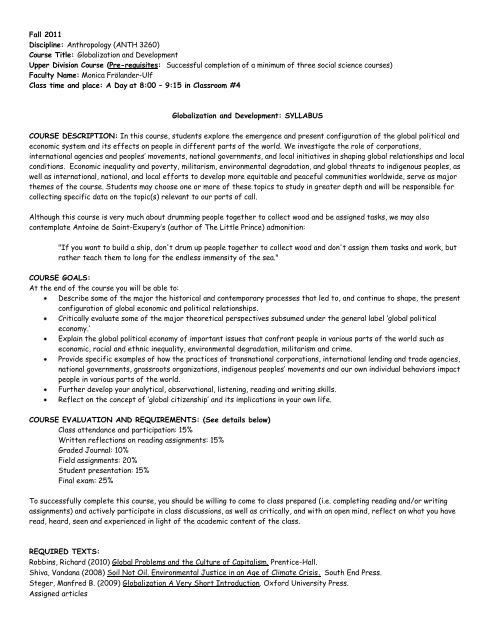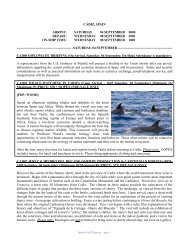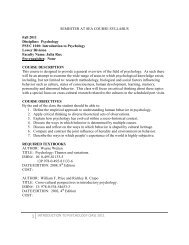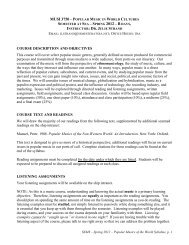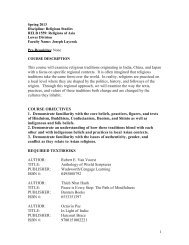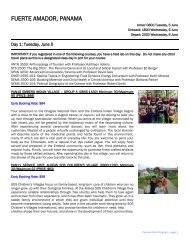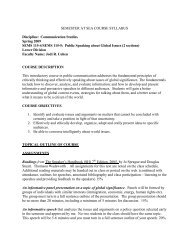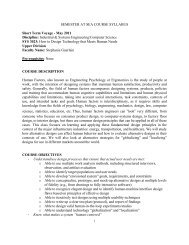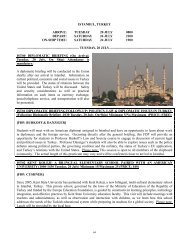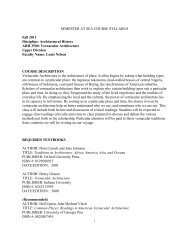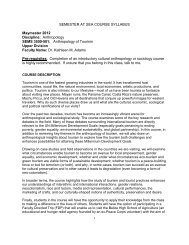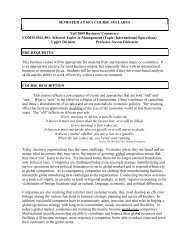ANTH 3260 - University of Virginia
ANTH 3260 - University of Virginia
ANTH 3260 - University of Virginia
Create successful ePaper yourself
Turn your PDF publications into a flip-book with our unique Google optimized e-Paper software.
Fall 2011<br />
Discipline: Anthropology (<strong>ANTH</strong> <strong>3260</strong>)<br />
Course Title: Globalization and Development<br />
Upper Division Course (Pre-requisites: Successful completion <strong>of</strong> a minimum <strong>of</strong> three social science courses)<br />
Faculty Name: Monica Frölander-Ulf<br />
Class time and place: A Day at 8:00 – 9:15 in Classroom #4<br />
Globalization and Development: SYLLABUS<br />
COURSE DESCRIPTION: In this course, students explore the emergence and present configuration <strong>of</strong> the global political and<br />
economic system and its effects on people in different parts <strong>of</strong> the world. We investigate the role <strong>of</strong> corporations,<br />
international agencies and peoples‟ movements, national governments, and local initiatives in shaping global relationships and local<br />
conditions. Economic inequality and poverty, militarism, environmental degradation, and global threats to indigenous peoples, as<br />
well as international, national, and local efforts to develop more equitable and peaceful communities worldwide, serve as major<br />
themes <strong>of</strong> the course. Students may choose one or more <strong>of</strong> these topics to study in greater depth and will be responsible for<br />
collecting specific data on the topic(s) relevant to our ports <strong>of</strong> call.<br />
Although this course is very much about drumming people together to collect wood and be assigned tasks, we may also<br />
contemplate Antoine de Saint-Exupery‟s (author <strong>of</strong> The Little Prince) admonition:<br />
"If you want to build a ship, don't drum up people together to collect wood and don't assign them tasks and work, but<br />
rather teach them to long for the endless immensity <strong>of</strong> the sea."<br />
COURSE GOALS:<br />
At the end <strong>of</strong> the course you will be able to:<br />
Describe some <strong>of</strong> the major the historical and contemporary processes that led to, and continue to shape, the present<br />
configuration <strong>of</strong> global economic and political relationships.<br />
Critically evaluate some <strong>of</strong> the major theoretical perspectives subsumed under the general label „global political<br />
economy.‟<br />
Explain the global political economy <strong>of</strong> important issues that confront people in various parts <strong>of</strong> the world such as<br />
economic, racial and ethnic inequality, environmental degradation, militarism and crime.<br />
Provide specific examples <strong>of</strong> how the practices <strong>of</strong> transnational corporations, international lending and trade agencies,<br />
national governments, grassroots organizations, indigenous peoples‟ movements and our own individual behaviors impact<br />
people in various parts <strong>of</strong> the world.<br />
Further develop your analytical, observational, listening, reading and writing skills.<br />
Reflect on the concept <strong>of</strong> „global citizenship‟ and its implications in your own life.<br />
COURSE EVALUATION AND REQUIREMENTS: (See details below)<br />
Class attendance and participation: 15%<br />
Written reflections on reading assignments: 15%<br />
Graded Journal: 10%<br />
Field assignments: 20%<br />
Student presentation: 15%<br />
Final exam: 25%<br />
To successfully complete this course, you should be willing to come to class prepared (i.e. completing reading and/or writing<br />
assignments) and actively participate in class discussions, as well as critically, and with an open mind, reflect on what you have<br />
read, heard, seen and experienced in light <strong>of</strong> the academic content <strong>of</strong> the class.<br />
REQUIRED TEXTS:<br />
Robbins, Richard (2010) Global Problems and the Culture <strong>of</strong> Capitalism. Prentice-Hall.<br />
Shiva, Vandana (2008) Soil Not Oil. Environmental Justice in an Age <strong>of</strong> Climate Crisis. South End Press.<br />
Steger, Manfred B. (2009) Globalization A Very Short Introduction. Oxford <strong>University</strong> Press.<br />
Assigned articles
COURSE OUTLINE:<br />
AUGUST 28 (A1)<br />
WHAT IS <strong>ANTH</strong>ROPOLOGY? WHAT IS GLOBAL POLITICAL ECONOMY? GLOBALIZATION?<br />
Discussion <strong>of</strong> course requirements and assignments. Introduction <strong>of</strong> basic concepts.<br />
Reading assignments:<br />
American Anthropological Association website information.<br />
Ellen Meiksins Wood (1998) “The Communist Manifesto 150 Years Later,” in Karl Marx and Friedrich Engels, The<br />
Communist Manifesto. Monthly Review, pp. 89-112.<br />
AUGUST 30 (A2), SEPTEMBER 1 (A3)<br />
<strong>ANTH</strong>ROPOLOGICAL THEORIES, METHODS AND DATA GATHERING TECHNIQUES. Karl Marx‟<br />
influence on the social sciences. Ethnographic field research and its ethical and practical hazards.<br />
Reading assignments:<br />
Richard Robbins, Introduction and Ch. 1 “Constructing the Consumer” pp. 1-32.<br />
Manfred Steger, Preface and Ch. 1 “Globalization: A Contested Concept” pp. 1-16.<br />
Jaafar Aksikas, “Prisoners <strong>of</strong> Globalization: Marginality, Community, and the New Informal Economy in Morocco.”<br />
Mediterranean Politics, Vol. 12, #2, 249–262, July 2007.<br />
FIELD ASSIGNMENTS (Casablanca, Morocco, September 3-6):<br />
Students may choose one (or more) <strong>of</strong> the following assignments:<br />
Investigate and document visible legacies <strong>of</strong> French colonial rule on Moroccan society.<br />
Make observations about informal economic activities, wealth distribution, and poverty.<br />
Document the place <strong>of</strong> Islam in the political economy <strong>of</strong> Morocco.<br />
Take notes on the experience <strong>of</strong> doing field research in light <strong>of</strong> our class discussion <strong>of</strong> the topic.<br />
Recommended in-port programs:<br />
CAS15 CASABLANCA CITY ORIENTATION (1330-1730) Minimum 21/Maximum 86 (PRICE: $39) PRE-SALE ONLY<br />
SEPTEMBER 7 & 9 (A4 & A5)<br />
THE CREATION OF A GLOBAL POLITICAL ECONOMY. Modes <strong>of</strong> production and social formations: Communal mode <strong>of</strong><br />
production, archaic states, industrial capitalism, socialism, and Marx‟ vision <strong>of</strong> communism. The place <strong>of</strong> slavery and colonialism in<br />
human history.<br />
Reading assignments:<br />
Richard Robbins, Part 1. Ch. 2 “The Laborer in the Culture <strong>of</strong> Capitalism‟” pp. 33-54, & Ch. 3 “The Rise and Fall <strong>of</strong> the<br />
Merchant, Industrialist, and Financier” pp. 55-95. [Focus on the historical information.]<br />
“Introduction” in James Ferguson, Global Shadows: Africa in the Neoliberal World Order.<br />
All students must pick a main topic, which they will research throughout the journey, discuss their choice with the<br />
instructor, and start their data collection.<br />
SEPTEMBER 11 (A6)<br />
GLOBALIZATION AND THEORIES OF SOCIAL CHANGE. This class focuses on various ways <strong>of</strong> understanding social change,<br />
including modernization/neoliberal, dependency/ world systems theories, and indigenous peoples‟ perspectives. Why did (do)<br />
some populations change their ways <strong>of</strong> making a living quite rapidly, while others have done so much more slowly? What is the<br />
role <strong>of</strong> institutionalized power structures and human agency in promoting or preventing change?<br />
Reading assignments:<br />
Manfred Steger, Ch. 2 “Globalization and History: Is Globalization a New Phenomenon?” pp. 17-37.<br />
Immanuel Wallerstein, “The Rise and Future Demise <strong>of</strong> the World Capitalist System,‟ pp. 63-69,”Joseph E. Stiglitz<br />
“Globalism's discontents” pp. 200-207, and Amartya Sem, “How to judge globalism” pp. 16-21 in Lechner, Frank & John<br />
Boli, eds. (2008) The Globalization Reader.<br />
Additional recommended readings:<br />
E. Gyimah-Boadi, “Another Step Forward for Ghana,” Journal <strong>of</strong> Democracy, Vol. 20, # 2, (2009) [Word Document, 6<br />
pp.]<br />
Emmanuel Akyeampong & Pashington Obeng, “Spirituality, Gender, and Power in Asante History” in Oyeronke Oyewumi,<br />
ed. (2005) African Gender Studies. A Reader, pp. 23-48.
FIELD ASSIGNMENTS (Tema, Ghana, September 13-16):<br />
Students may also choose one (or more) <strong>of</strong> the following assignments:<br />
Investigate visible legacies <strong>of</strong> the Atlantic slave trade and British colonialism.<br />
Investigate the nature <strong>of</strong> West African pre-colonial states and the way they have changed over time in response to the<br />
slave trade, colonial, and neo-colonial imperatives.<br />
Observe and take notes on the ways in which life in Jukwa has changed in the last two decades and the reasons why these<br />
changes have occurred as viewed through the eyes <strong>of</strong> the local population<br />
[FDP: FRÖLANDER-ULF] ACR27 FROM DIRT ROADS TO4G NETWORKS: THE “NEW AFRICA” (07:00 Day 2 –20:00<br />
Day 3) Minimum 18/Maximum 30(PRICE: $293 + OOPEX) PRE-SALE ONLY (This FDP is strongly recommended for this<br />
course)<br />
Other recommended in-port programs:<br />
ACR23 CASTLES AND SLAVE DUNGEONS -GROUP A (0700-2000) Minimum 30/Maximum 80(PRICE: $116) PRE-SALE<br />
ONLY [FDP: HUNT & NELSON]<br />
ACR12TEMA/GAQUEEN MOTHERS (1000-1400) Minimum 15/Maximum 40(PRICE: $67) PRE-SALE ONLY<br />
ACR16ENVIRONMENTAL ACTIVISM & POLICY IN GHANA (1030-1200, On Ship) Minimum 12/No Maximum (PRICE:<br />
$9) PRE-SALE ONLY [FDP: MOLLOY]<br />
ACR34GLOBAL MAMAS: MICRO-LENDING IN ACTION (0800–1600) Minimum 20/Maximum 30(PRICE: $77) PRE-<br />
SALE ONLY<br />
SEPTEMBER 18 (A7)<br />
COMMUNAL MODES OF PRODUCTION. The political economy <strong>of</strong> bands, tribes and chiefdoms. What do they teach us? Why<br />
are subsistence economies incompatible with industrial capitalist and socialist states?<br />
Reading assignments:<br />
Sahlins, Marshall D., (1972) “The Original Affluent Society” in Stone Age Economics. Chicago.<br />
Richard Robbins, Part 2. Ch. 9 “Indigenous Groups and Ethnic Conflict” pp. 234-259.<br />
“UN Declaration on the Rights <strong>of</strong> Indigenous Peoples” http://www.iwgia.org/sw248.asp<br />
SEPTEMBER 20 READING DAY<br />
SEPTEMBER 21 (A8)<br />
THE POLITICAL ECONOMY OF CONTEMPORARY SOUTH AFRICA.<br />
Reading assignments:<br />
Patrick Bond, "North versus South: Expect More Global Apartheid--and [South African] Collaboration--in 2006."<br />
MRZine, January 7. (http://mrzine.monthlyreview.org/2006/bond070106.html)<br />
Patrick Bond, Darlene Miller and Greg Ruiters (2000)”The Southern African Working Class: Production, Reproduction<br />
and Politics" pp. 119-142 in Panitch and Leys, eds. [Available on line at<br />
http://socialistregister.com/index.php/srv/article/view/5758/2654 ]<br />
e Sylvain, “Disorderly development: globalization and the idea <strong>of</strong> culture in the Kalahari.” American Ethnologist<br />
32(3): 354-70.<br />
Jacqueline Solway, Human Rights And Ngo „Wrongs‟: Conflict Diamonds, Culture Wars And The „Bushman Question‟<br />
Africa, 79 (3):321-346, 2009<br />
DUE DATE: Reading Reflection assignment #1<br />
FIELD ASSIGNMENTS (Cape Town, South Africa, September 23-28):<br />
Students may choose one (or more) <strong>of</strong> the following assignments:<br />
Investigate South African wealth distribution and the creation <strong>of</strong> urban slums in the context <strong>of</strong> South African colonial<br />
history and apartheid.<br />
Specifically familiarize themselves with the conditions faced by the San people today.<br />
Investigate the role <strong>of</strong> transnational mining companies, including DeBeers, in South Africa.<br />
Document the changes (or the lack there<strong>of</strong>) that have occurred since Black South Africans got the right to vote in South<br />
Africa.<br />
[FDP: FRÖLANDER-ULF] CAP09 !KHWA TTU ROUTE (1230-1900) Minimum 23/Maximum 40 (PRICE: $94) PRE-SALE<br />
ONLY (This FDP is highly recommended for this course)<br />
Other recommended in-port programs:<br />
CAP06 RELIGIOUS RESPONSES TO CLIMATE CHANGE IN SOUTH AFRICA (1000-1700) Minimum 15/Maximum 30<br />
(PRICE: $99) PRE-SALE ONLY [FDP: SPENCER]<br />
CAP29 ROBBEN ISLAND OVERNIGHT (1000 Day 2 – 1045 Day 3) Minimum 19/Maximum 40 (PRICE: $410) PRE-SALE
CAP63 CAPE TOWN, APARTHEID & ROBBEN ISLAND (0815-1715) Minimum 36/Maximum 80 (PRICE: $159) PRE-SALE<br />
ONLY [FDP: CASTEEN & BUNCK]<br />
CAP68 BISHOP PETER STOREY: INTERFAITH RESISTANCE TO APARTHEID & WALKING TOUR OF CAPE TOWN (1145-<br />
1700) Minimum 21/Maximum 24 (PRICE: $51) PRE-SALE ONLY<br />
CAP32 TOWNSHIP HOMESTAY – GROUP A (1600 Day 2 – 1000 Day 3) Minimum16/Maximum 32 (PRICE: $124) PRE-SALE<br />
ONLY<br />
CAP44 OPERATION HUNGER - GROUP A (0900-1800) Minimum 35/Maximum 40 (PRICE: $48) PRE-SALE ONLY<br />
SEPTEMBER 29 AFRICA REFLECTION<br />
SEPTEMBER 30 (A9)<br />
ARCHAIC AND MODERN NATION-STATES. Causes and cultural consequences <strong>of</strong> state formation. Effects <strong>of</strong> European<br />
colonial domination on South and Southeast Asian archaic states. Global capitalism and the nation-state.<br />
Reading assignments:<br />
Richard Robbins, Part 1. Ch. 4 “The Nation-State in the Culture <strong>of</strong> Capitalism” pp. 96-121.<br />
Manfred Steger, Ch. 4 “The Political Dimension <strong>of</strong> Globalization” pp. 58-70.<br />
Strange, Susan (2008) “Declining authority <strong>of</strong> states” pp. 219-224, in Lechner & Boli, eds. The Globalization Reader.<br />
James Heitzman and Robert L. Worden, editors. India: A Country Study. Washington: GPO for the Library <strong>of</strong><br />
Congress, 1995. http://countrystudies.us/india/15/htm [Word document 6pp.]<br />
Ronald J. Cima, ed. Vietnam: A Country Study. Washington: GPO for the Library <strong>of</strong> Congress, 1987. Library <strong>of</strong><br />
Congress http://countrystudies.us/vietnam/15.htm [Word document 4pp.]<br />
OCTOBER 2 (A10)<br />
GLOBAL INSTITUTIONS, POVERTY AND INEQUALITY. Transnational corporations, international lending and trading<br />
agencies, and international aid agencies. Analyzing global institutional economic and power structures in the creation and<br />
alleviation <strong>of</strong> poverty and inequality.<br />
Reading assignments:<br />
Manfred Steger, Ch. 3 “The Economic Dimension <strong>of</strong> Globalization” pp. 38-57.<br />
Richard Robbins, Part 1. Ch. 3 Revisit “The Rise and Fall <strong>of</strong> the Merchant, Industrialist, and Financier” pp. 55-95<br />
[Focus on contemporary conditions.] Part 2. Ch. 6 “Hunger,, Poverty, and Economic Development” pp. 155-182, Ch. 8<br />
“Health and Disease” pp. 207-233.<br />
Mike Davis, Planet <strong>of</strong> Slums, Ch. 2 “The Prevalence <strong>of</strong> Slums” pp. 20-49, Ch. 7 “SAPing the Third World” pp. 151-173<br />
Documentary: NOW segment on cotton farmers in Burkina Faso and the United States.<br />
OCTOBER 4 PORT LOUIS, MAURITIUS<br />
Recommended in-port program:<br />
MAU01 VISIT TO THE UNIVERSITY OF MAURITIUS (On Arrival – 1400) Minimum 16/Maximum 40 (PRICE: $58)<br />
OCTOBER 6 (A11)<br />
INDUSTRIAL CAPITALISM AND THE CULTURE OF CONSUMPTION. Selling U.S. material culture<br />
and consumption patterns around the world.<br />
Reading assignments:<br />
Manfred Steger, Ch. 5 “The Cultural Dimension <strong>of</strong> Globalization” pp. 71-83.<br />
Richard Robbins, Part 1. Ch. 1 Revisit “Constructing the Consumer” [Focus on contemporary conditions.]<br />
Kroll & Robbins, Ch. 9: Global Trade <strong>of</strong> Electronic Waste. Elizabeth Grossman, “Where Computers go to Die and Kill”<br />
(pp. 155-164)<br />
James L Watson, “McDonald's in Hong Kong“ from Lechner and Boli, eds., The Globalization Reader (pp. 125-140)<br />
OCTOBER 8 (A12)<br />
GLOBAL POLITICAL ECONOMY OF HUMAN-ENVIRONMENTAL RELATIONSHIPS.<br />
In this segment we examine the effects <strong>of</strong> a variety <strong>of</strong> global-reach institutions (corporations, militaries, international<br />
agencies) on the natural environment and people‟s relationships to it and contrast this with human-environmental<br />
interactions in communal modes <strong>of</strong> production.<br />
DUE DATE: Reading Reflection assignment #2<br />
Reading assignments:<br />
Richard Robbins, Part 2. Ch. 7 “Environment and Consumption” pp. 155-206.
Manfred Steger, Ch. 6 “The Ecological Dimension <strong>of</strong> Globalization” pp. 84-97.<br />
Vandana Shiva, Soil, Not Oil, Ch. 1-3 (pp. 1-94)<br />
Mike Davis, Planet <strong>of</strong> Slums, Ch. 6 “Slum Ecology” (pp. 121-150)<br />
FIELD ASSIGNMENTS (Chennai, India, October 10-15):<br />
Students may choose one (or more) <strong>of</strong> the following assignments:<br />
Document legacies <strong>of</strong> pre-colonial state formation in India.<br />
Observe and document consumption patterns among the wealthy and the poor in Chennai.<br />
Gather data from local organizations concerned about dam-building projects, impoverished farmers, homelessness, and/or<br />
urban slum conditions.<br />
Collect data about living conditions in Chennai that either support and/or contradict Mike Davis‟ descriptions in Planet <strong>of</strong><br />
Slums<br />
Recommended in-port programs:<br />
CHE11 VISIT TO A CALL CENTER: PEROT SYSTEMS (TBA) Minimum 15/ Maximum 30 (PRICE: TBA) [FDP: AULETTE]<br />
CHE28 CHILD LABOR IN RURAL INDIA: OVERNIGHT VILLAGE STAY (1300 Day 2 – 1830 Day 3) Minimum<br />
20/Maximum 50 (PRICE: $59) PRE-SALE ONLY<br />
CHE53 SOCIOECONOMIC PROBLEMS IN CHENNAI – GROUP A (0830-1230) Minimum 15/Maximum 30 (PRICE: $32)<br />
OCTOBER 16 INDIA REFLECTION<br />
OCTOBER 17 (A13)<br />
GLOBAL POLITICAL ECONOMY OF WORK. Here we analyze the historical constitution <strong>of</strong> a capitalist labor force and the<br />
more recent patterns <strong>of</strong> labor force segmentation, outsourcing, and migratory flows. What are the major issues confronting<br />
workers in India and Hong Kong and in Export Processing Zones in Malaysia, Vietnam, and China and workers in the capitalist<br />
economies <strong>of</strong> the U.S. and Europe?<br />
Reading assignments:<br />
Richard Robbins, Ch. Part 1. Ch. 2 “The Laborer in the Culture <strong>of</strong> Capitalism‟” pp. 33-54.<br />
Chang, Leslie, Factory Girls, Ch 4 “The Talent Market” (pp. 73-97), Ch. 5 “Factory Girls” (pp. 98-119), Ch. 7 “Square and<br />
Round” (pp. 171-205).<br />
Readings on workers‟ movements/tourism<br />
Documentary: China Blue (if available)<br />
DUE DATE: Turn in your academic journal<br />
FIELD ASSIGNMENTS (Penang, Malaysia, October 19-21):<br />
Students may choose one (or more) <strong>of</strong> the following assignments:<br />
Take field notes on what they observe about rank and class inequalities and compare these to what they have observed in<br />
previous ports <strong>of</strong> call.<br />
Take field notes on the relationships between tourists and the local population.<br />
Based on their own observations, reflect on the ways in which industrial capitalism is impacting the Malaysian population.<br />
Recommended in-port programs:<br />
PEN11 ETHNIC COMMUNITIES IN MALAYSIA (1030-1530) Minimum 15/Maximum 30 (PRICE: $33) [FDP: HUNT &<br />
THOMAS]<br />
PEN22 INDIGENOUS INDUSTRIES NEAR PENANG: RUBBER, PALM OIL AND RICE (0930-1730) Minimum 16/Maximum<br />
38 (PRICE: $71)<br />
OCTOBER 23 (A14)<br />
GLOBAL POLITICAL ECONOMY OF MILITARISM. In this class period we investigate the economic,<br />
political and cultural dimensions <strong>of</strong> civil wars, foreign occupations, the international weapons trade and „extra-legal‟<br />
violence.<br />
Reading assignments:<br />
Manfred Stager, Ch. 7 “Ideologies <strong>of</strong> Globalization…” pp. 98-135.<br />
Nordstrom, Carolyn (2007) Global Outlaws: Crime, Money and Power in the Contemporary World, Ch. 1 “The War<br />
Orphan” pp. 3-9, Ch. 12 “Ports” pp. 115-127, Ch. 13 “Drugs pp. 129-137. Ch. 14 “The Culture <strong>of</strong> Criminals” pp. 139-146;<br />
Ch. 16 “The World Port” pp. 157-165.<br />
Nordstrom (2004) Shadows <strong>of</strong> War: Violence, Power and International Pr<strong>of</strong>iteering in the Twenty-First Century, Ch. 5<br />
“Violence” pp. 55-70, Ch. 16 “Why Don‟t‟ We Study the Shadows?” pp. 225-238.<br />
Jeremy Scahill, “Blackwater's Black Ops,” The Nation, September 15, 2010.<br />
http://www.thenation.com/article/154739/blackwaters-black-ops
Documentary: “Why We Fight”<br />
FIELD ASSIGNMENTS (Ho Chi Minh City, Vietnam, October 25-31):<br />
Students may choose one (or more) <strong>of</strong> the following assignments:<br />
Apply what they have learned about colonialism to the history <strong>of</strong> Vietnam.<br />
Investigate the concepts <strong>of</strong> socialism and, most recently, state-controlled capitalism in the context <strong>of</strong> recent Vietnamese<br />
history and contemporary conditions.<br />
Document the visible legacies <strong>of</strong> U.S. invasion and occupation <strong>of</strong> Vietnam.<br />
[FDP: FRÖLANDER-ULF] HCM19 FORMER UPI PHOTOGRAPHER AND THE MUSEUM OF WAR REMNANTS – GROUP A<br />
(1300-1730) Minimum 11/Maximum 25 (PRICE: $42) This FDP is highly recommended for this course<br />
[FDP: FRÖLANDER-ULF & GREEN] HCM28 CU CHI TUNNELS AND CAO DAI TEMPLE – GROUP A (0800-1900) Minimum<br />
16/Maximum 80 (PRICE: $59)<br />
Other recommended in-port programs:<br />
HCM11 CLIMATE CHANGE & ENVIRONMENTAL ISSUES IN VIET NAM & THE MEKONG DELTA (0930-1800)<br />
Minimum 20/Maximum 20 (PRICE: $29 +OOPEX) [FDP: SPENCER]<br />
HCM12 BEN THANH MARKET AND MUSEUM OF WAR REMNANTS (WITH LUNCH) (1000-1530) Minimum<br />
20/Maximum 30 (PRICE: $42 + OOPEX) [FDP: RUX]<br />
HCM27 MEKONG DELTA DAY TRIP - GROUP A (0800-1630) Minimum 16/Maximum 80 (PRICE: $46) [FDP: AULETTE]<br />
OCTOBER 31 READING DAY<br />
NOVEMBER 1 (A15)<br />
GLOBAL FINANCE AND TRADE. The impact <strong>of</strong> transnational corporations and international<br />
organizations, such as the IMF, World Bank and WTO on economic relationships, political power, and culture. How are<br />
„we‟ AND „they‟ affected?<br />
Reading assignments:<br />
Karen Ho (2005) “Situating global capitalisms: A view from Wall Street investment banks,” pp. 137-164, in Jonathan<br />
Xavir Inda and Renato Rosaldo, The Anthropology <strong>of</strong> Globalization: A Reader.<br />
Peter Kragelund (2009) “Knocking on a wide open door: Chinese investments in Africa.” Review <strong>of</strong> African Political<br />
Economy Vol.36 No.122 (December 2009), pp. 479-517<br />
Han, Anna M. (2000) “Holding Up More Than Half the Sky: Marketization and the Status <strong>of</strong> Women in China” in Wing,<br />
Adrien Katherine, ed. (2000) Global Critical Race Feminism: An International Reader.<br />
Documentary: “China Blue” (if available)<br />
FIELD ASSIGNMENTS (Hong Kong & Shanghai, China, November 3-8):<br />
Students may choose one (or more) <strong>of</strong> the following assignments:<br />
Students are asked to:<br />
Observe and take note <strong>of</strong> which corporate entities are prominently present in both cities and investigate the degree to<br />
which these influence national policies.<br />
Analyze the nature <strong>of</strong> consumer culture in both cities: What are the similarities and differences in their own and the locally<br />
observed consumption patterns?<br />
Analyze the effects <strong>of</strong> transnational corporations on subsistence and work patterns in Hong Kong and Shanghai,<br />
respectively.<br />
Recommended in-port programs:<br />
HKG03 LABOR & ENVIRONMENTAL ISSUES IN CHINESE FACTORY ZONES (0830–1830) Minimum 20/Maximum 20<br />
(PRICE: $62) [FDP: SPENCER]<br />
HKG11 CONCEPTIONS OF HUMAN RIGHTS IN CHINA (1300-1500 On Ship) Minimum 18/Maximum 50 (PRICE: $13) [FDP:<br />
FOWLER & BUNCK]<br />
SHA70 GLOBALIZATION IN CONTEMPORARY CHINA: A PERSONAL VIEW (1400-1600, On Ship) Minimum 12/No<br />
Maximum (PRICE: $10) [FDP: HUNT]<br />
NOVEMBER 9 (A16)<br />
CHALLENGES TO GLOBALIZATION. Small is beautiful?<br />
Reading assignments:<br />
Manfred Steger, Revisit Ch. 7 “Ideologies <strong>of</strong> Globalization…” [Focus on resistance.]<br />
Vandana Shiva, Soil, Not Oil, Ch. 4 “Soil, Not Oil” pp. 95-132.<br />
E. F. Schumacher, “Buddhist Economics,” http://www.smallisbeautiful.org/buddhist_economics/english.html
CIA Fact Book: Japan<br />
Mari Yamamoto, “Japan's Grassroots Pacifism,” Japan Focus, February 24, 2005 pp.1-6 [http://www.japanfocus.org/-<br />
David-McNeill/2102]<br />
FIELD ASSIGNMENTS (Kobe & Yokohama, November 11-15):<br />
Students may choose one (or more) <strong>of</strong> the following assignments:<br />
Pick any one <strong>of</strong> previously assigned field research topics to gather comparative data from Kobe and/or Yokohama.<br />
Investigate Japanese attitudes toward nuclear energy and nuclear weapons.<br />
Investigate the history and contemporary beliefs and practices <strong>of</strong> Japanese peace movements.<br />
[FDP FRÖLANDER-ULF] KOB28 POPOKI’S PORT ISLAND COMMUNITY PEACE MAP (0930-1700) Minimum 8/Maximum<br />
13 (PRICE: $20 + OOPEX)<br />
Other recommended in-port programs:<br />
KOB14 HIROSHIMA BY BULLET TRAIN (1300-2245) Minimum 35/Maximum 70 (PRICE: $444)<br />
KOB12 OSAKA CASTLE & INTERNATIONAL PEACE CENTER (1300-1800) Minimum 15/Maximum 20 (PRICE: $60<br />
+OOPEX) [FDP: HUFFMAN]<br />
NOVEMBER 16, 18 (A17 & A18)<br />
HUMAN AGENCY AND INSTITUTIONAL CHANGE: PEOPLE’S MOVEMENTS. These course segments focus on a<br />
broad range <strong>of</strong> resistance movements and strategies, including military resistance, revitalization movements, workers‟<br />
and farmers‟ organizations, liberation theology, political and cultural nationalism, peace movements, and<br />
environmentalism.<br />
Reading assignments:<br />
Richard Robbins, Part 3. Ch. 10 “Peasant Protest, Rebellion and Resistance” pp. 261-289, Ch. 11 “Anti-Systemic Protest”<br />
pp. 290-310, Ch. 12 “Religion and Anti-Systemic Protest‟ pp. 311- 333.<br />
Terry Boswell & Christopher Chase-Dunn “Transnational social movements and democratic socialist parties in the<br />
semiperiphery: On to global democracy,” pp. 317-335 in Chase-Dunn, Christopher and Salvatore J. Babones, eds. (2006)<br />
Global Social Change: Historical and Comparative Perspectives.<br />
NOVEMBER 19 READING DAY<br />
NOVEMBER 20 & 22 (A19 & A20)<br />
THE UNITED STATES: A COLONIAL POWER? Are American Indian nations and Hawai‟i “Domestic<br />
colonies” <strong>of</strong> the United States? What are indigenous peoples in North America and Hawai‟i thinking and doing about the<br />
issue <strong>of</strong> sovereignty and self-determination?<br />
DUE DATE: Reading Reflection Assignment #3<br />
Reading assignments:<br />
Haunani-Kay,Trask, “Ho‟okupu aKa Lahui Hawai‟i: The Master Plan 1995” pp. 211- 236 in Native Daughter: Colonialism<br />
and Sovereignty in Hawai‟i<br />
Documentaries: “Hawai‟i‟s Last Queen” & “Spirits for Sale”<br />
FIELD ASSIGNMENTS (Hilo, Hawai’i, November 24):<br />
Students may choose one (or more) <strong>of</strong> the following assignments:<br />
Observe and take notes on the impact <strong>of</strong> the tourism industry on Hawai‟ian culture<br />
Learn about contemporary efforts by indigenous Hawai‟ians to gain greater autonomy from U.S. economic, political, and<br />
cultural domination.<br />
Investigate the importance <strong>of</strong> Hawai‟i for U.S. strategic military interests.<br />
NOVEMBER 25 & 27 (A21 & A22)<br />
GLOBAL TO LOCAL: LOCAL TO GLOBAL. These two class periods give us the opportunity to pull together the<br />
wealth <strong>of</strong> information that we have been given and gathered ourselves on the journey. We reflect on the nature <strong>of</strong> our<br />
relationships to each other across the planet in class discussions and group presentations.<br />
Reading assignments:<br />
Manfred Steger, Ch. 8 “Assessing the Future <strong>of</strong> Globalization” pp. 129-135.<br />
Otero, Gerardo (2004). “Global Economy, Local Politics: Indigenous Struggles, Civil Society and Democracy.” Canadian<br />
Journal <strong>of</strong> Political Science 37(2):325-346.<br />
Barry Bearak, “For Some Bushmen, a Homeland Worth the Fight,” New York Times, Nov 5, 2010.<br />
Vandana Shiva, Soil, Not Oil, “Conclusion. Unleashing Shakti: Our Power to Transform,” pp. 133-144.
NOVEMBER 29 READING DAY<br />
NOVMEBER 30 (A23)<br />
WHAT CAN WE DO? WHAT SHOULD WE DO? WHAT SHOULDN’T WE DO? The final question we<br />
ponder is what we intend to do with all the knowledge we have been privileged to receive. Anthropologists and other<br />
social scientists have developed ethical guidelines to ensure the safety and privacy <strong>of</strong> the people they work with. But do<br />
our responsibilities as anthropologists and ordinary citizens go beyond this?<br />
Reading assignments:<br />
Richard Robbins, Ch. 13 “Constructing the Citizen Activist” pp. 334-352.<br />
Noah Shachtman, “An Army Anthropologist‟s Controversial culture Clash;”<br />
http://www.wired.com/dangerroom/2008/09/controversial-a/<br />
Norman Solomon, “No. Higher Consciousness Won‟t Save Us,” http://www.zcommunications.org/no-higherconsciousness-won-t-save-us-by-norman-solomon<br />
Emily Benedek, “My Mom Always Says, „Never Trust a White Person,‟” in Beyond the Four Corners <strong>of</strong> the<br />
World. A Navajo Woman‟s Journey, Ch. 4. pp. 27-35.<br />
Documentary: “The Seattle Syndrome” (or other documentary on transnational people‟s movements)<br />
DUE DATE: Written field component (see Explanation <strong>of</strong> Course Requirement, Written Assignments d.)<br />
DECEMBER 2 STUDY DAY<br />
DUE DATE: Journal Assignment<br />
DECEMBER 4-5 PUNTARENAS, COSTA RICA<br />
DECEMBER 6: FINAL EXAM<br />
DECEMBER 9-11 HAVANA, CUBA<br />
Recommended in-port programs: TBA<br />
DECEMBER 12 REFLECTION & CONVOCATION<br />
EXPLANATION OF COURSE REQUIREMENTS:<br />
Class Preparation, Attendance and Participation (15% <strong>of</strong> grade)<br />
It is in the classroom that the important work <strong>of</strong> integrating readings and field experience is taking place in this course.<br />
Therefore, class preparation, attendance, and general participation are monitored and highly valued as course requirements.<br />
One unexcused absence is allowed. Any further unexcused absences are penalized by an automatic loss <strong>of</strong> a full grade for<br />
every missed class. You must show a nurse‟s or doctor‟s note in order to be excused from class.<br />
Written Assignments<br />
a. Three reading reflection exercises (5% each; total 15% <strong>of</strong> grade)<br />
Periodically, I will give students questions about the readings assigned for the next class and ask that they write responses,<br />
bring them to class, and submit them to me for evaluation. Three <strong>of</strong> these will be graded. The goal is to help guide students‟<br />
understanding and integration <strong>of</strong> the materials and their critical reading skills as well as to improve the quality <strong>of</strong> class<br />
discussions.<br />
b. Graded Journal (10%) The journal allows students to keep track <strong>of</strong> what they have read, heard, observed and experienced<br />
throughout the semester. At least five entries about observations/experiences in each port-<strong>of</strong>-call should explicitly address<br />
course-related issues, including one or more <strong>of</strong> the Field Assignment questions listed for each port. The journal also provides a<br />
way for them to participate in the reflection sessions where we share in-port experiences and lessons learned. Students must<br />
submit the journals twice during the semester for feedback and finally for grading at the end <strong>of</strong> the journey.<br />
c. One take-home final essay exam (25% <strong>of</strong> grade)<br />
This exam gives students an opportunity to demonstrate their understanding <strong>of</strong> the course materials and their relevance to the<br />
field work assignments and cultural experiences in the countries visited. Students receive study questions ahead <strong>of</strong> time from<br />
which I will select some (they will not know which ones) for them to answer in class.<br />
d. Field component (20% <strong>of</strong> grade)
Students are organized into sets <strong>of</strong> field partners who focus their research on one <strong>of</strong> the major topics <strong>of</strong> the course and who<br />
will submit two jointly-written papers (3-4 –pages each), one for each <strong>of</strong> the two ports they choose as their primary field sites.<br />
Each paper will describe partners‟ observations, relate the observations to relevant issues in their course material, and analyze<br />
similarities and differences in partners‟ interpretations <strong>of</strong> their observations. It is also possible for a student to work alone. All<br />
students must consult with the instructor about the topic(s) they intend to research at the very latest by September<br />
9th.<br />
In-class Team Presentation (15% <strong>of</strong> grade)<br />
Each field partner team (or individual) will give one well-organized, 10-minute class presentation that discusses their<br />
assigned/chosen field research topic, with the data they collected in the ports they selected for their fieldwork and additional<br />
supportive data gathered from other sources. The goal is to share experiences, encourage the integration <strong>of</strong> readings,<br />
discussions, and fieldwork, and stimulate lively discussion among student colleagues.<br />
PLEASE NOTE: You MUST participate in at least ONE (and preferably TWO) <strong>of</strong> the faculty-directed practicums (FDPs)<br />
listed below.<br />
FROM DIRT ROADS TO 4G NETWORKS: THE NEW AFRICA<br />
!KHWA TTU ROUTE (SAN CULTURE AND EDUCATION CENTRE)<br />
UPI PJOTOGRA[HER & THE WAR REMNANTS MUSEUM<br />
CU CHI TUNNELS AND CAO DAI TEMPLE<br />
POPOKI’S PORT ISLAND COMMUNITY PEACE MAP<br />
The other recommended programs (if any) for each port are only suggestions at this point. You will receive more specific<br />
instructions in the beginning <strong>of</strong> the semester.<br />
TEXT BOOK INFORMATION<br />
AUTHOR: Robbins, Richard<br />
TITLE: Global Problems and the Culture <strong>of</strong> Capitalism<br />
PUBLISHER: Prentice-Hall<br />
ISBN-10 #0205801056<br />
ISBN-13#978-0205801053<br />
DATE/EDITION: 2010 (5 th ed.) (4 th ed. In SAS library)<br />
COST: $61.50<br />
AUTHOR: Steger, Manfred<br />
TITLE: Globalization. A Very short Introduction<br />
PUBLISHER: Oxford <strong>University</strong> Press<br />
ISBN-10 #0199552266<br />
ISBN-13#978-0199552269<br />
DATE/EDITION: 2009 Updated (In Alderman but not in SAS library)<br />
COST: $8.54<br />
AUTHOR: Shiva, Vandana<br />
TITLE: Soil, Not Oil: Environmental Justice in an<br />
Age <strong>of</strong> Climate Crisis<br />
PUBLISHER: South End Press<br />
ISBN-10 #0896087828<br />
ISBN-13#978-0896087828<br />
DATE/EDITION: 2008<br />
COST: $15.00<br />
"Men [people] fear thought more than they fear anything else on earth…Thought is subversive and revolutionary,<br />
destructive and terrible; thought is merciless to privilege, established institutions, and comfortable habits…But if<br />
thought is to become the possession <strong>of</strong> many, not the privilege <strong>of</strong> the few, we must have done with fear. It is fear that<br />
holds men [people] back - fear lest their cherished beliefs should prove delusions, fear lest the institutions by which<br />
they live should prove harmful, fear lest they themselves should prove less worthy <strong>of</strong> respect than they have supposed<br />
themselves to be." (Bertrand Russell, from Principles <strong>of</strong> Social Reconstruction, 1916. Quoted in Erich Fromm, On<br />
Disobedience and Other Essays, Routledge & Kegan Paul, 1984, pp.34-5)


